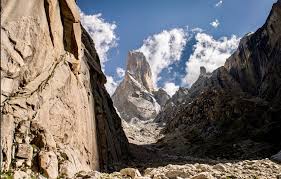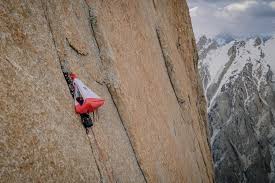Italy: Ragazzo makes first rope solo ascent of Pakistan’s ‘Eternal Flame’ alpine rock wall

Islamabad: Italian mountain climber Stefano Ragazzo has completed the first solo ascent of the 2,100-foot-long “Eternal Fame” alpine rock wall located in the Nameless Towers along the Karakoram range in Pakistan’s northern Gilgit-Baltistan region, according to Climbing, the world’s premier rock climbing magazine.
Eternal Flame is one of the world’s hardest, and most technical and remote alpine rock walls, established in 1989 by a team of renowned mountaineers including Wolfgang Güllich, Kurt Albert, Christof Stiegler, and Milan Sykora. Many climbers have tried scaling the wall in the past but success was not achieved until the 2009 attempt by Alex and Thomas Huber.

Rope soloing, the climbing technique used by Ragazzo, involves a climber using a rope for protection while ascending, but without a partner to belay or provide assistance. Instead, the climber uses specialized equipment and techniques to manage the rope and protect themselves in case of a fall.
“Italian alpinist Stefano Ragazzo broke new ground on July 25 by making the first rope-solo ascent of the 2,100-foot Eternal Flame on Pakistan’s Nameless Tower,” Climbing reported on Thursday. “He climbed the route over nine days in a ground-up style.”
The report said Regazzo had no hesitation or reservations about using equipment or gear to aid his ascent, and the objective was “less athletic and more about overcoming the logistical and mental hurdles” of making it up a 2,100-foot wall alone at altitude.
“The only personal requirement he held himself to was that, unlike the free ascentionists, he would make a continuous ground-up ascent without any fixed lines,” Climbing said. “He brought only a single 60-meter rope and a tagline for his haul bag. Once he started his climb, he resolved not to descend unless he had ticked the summit or accepted defeat.”
Ragazzo also ran out of water which is practically a “game over” for mountain climbers because hydration staves off altitude sickness deemed crucial at 20,000 feet.
“Before dark, I realized I only had 300 milliliters of water,” he said. “A light snow was falling, but the route was so steep that there were no ledges collecting snow that he could melt.”
In his last days of scaling the mountain, he faced severe shortages of food and water with lashing storms that made him stay inside his portaledge, or deployable tent, for an extra two days.
“I don’t know what happened, but I woke up at 5 am. and there was a blue sky. No clouds. I knew it was my last chance,” he said. “When I reached the summit I realized I didn’t even know how many days I was on the wall.”
Earlier this month, French mountaineer Benjamin Vedrines made history’s fastest-ever ascent of K2. He scaled the world’s second-highest mountain — standing at 8,611 meters (28,251 feet) on the border of Pakistan and China — in 10 hours, 59 minutes and 59 seconds on July 28.
Pakistan, home to the mighty Karakoram, Himalayan, and Hindukush mountain ranges, attracts foreign mountaineers from around the world each year. The country’s rugged and majestic peaks, including K2 and Nanga Parbat, offer unparalleled climbing challenges and breathtaking scenery.





